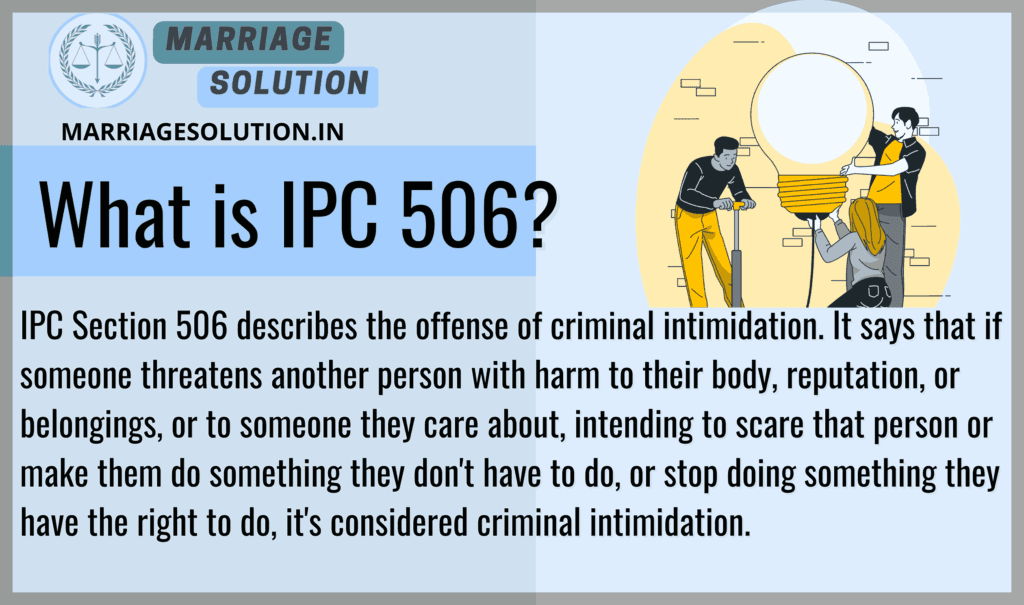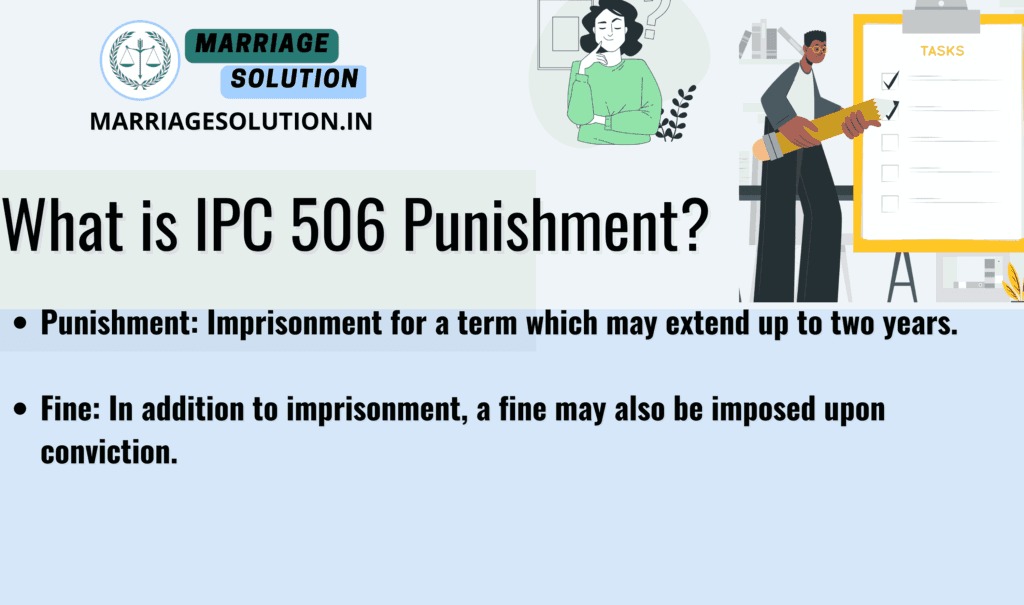Introduction of IPC Section 506
IPC Section 506 is a law that deals with scaring or threatening someone to make them do something against their will. Here’s a breakdown:
- If someone threatens to harm you physically, damage your reputation, or harm your belongings,
- They might also threaten someone you care about,
- Their aim is to make you scared or force you to do something you don’t want to do, or stop you from doing something you have the right to do.
This is known as criminal intimidation under the law.
What is IPC Section 506 ?
IPC Section 506 describes the offense of criminal intimidation. It says that if someone threatens another person with harm to their body, reputation, or belongings, or to someone they care about, intending to scare that person or make them do something they don’t have to do, or stop doing something they have the right to do, it’s considered criminal intimidation.

IPC Section 506 Overview
IPC Section 506 is a law that deals with scaring or threatening someone to make them do something they don’t want to do. If someone threatens to harm you or your reputation to make you afraid or force you into actions you don’t choose, it’s called criminal intimidation. This law aims to protect people from being coerced or frightened into doing things against their will.
Key Points
- Threat Essentials:
- This part of IPC 506 deals with threats made by one person to another. The threat could involve injury to the person, damage to their reputation, or harm to their property. It also includes threats directed towards someone the victim cares about, like family members or close associates.
- The key here is that these threats are made with the intention to cause fear or alarm in the victim.
- Causing Alarm:
- For an action to be considered criminal intimidation under IPC 506, the threat must succeed in causing alarm or fear in the victim. The victim should genuinely feel threatened or concerned about the consequences of the threat.
- Illegal Acts:
- Criminal intimidation involves using threats to compel the victim to perform an act that is illegal, something they are not legally obligated to do. It can also involve coercing the victim to refrain from performing a legal act which they are entitled to do.
- Mode of Threat:
- The mode of threat can vary widely. It could be verbal threats, written communication (such as letters or emails), gestures, or even silence in certain situations where a response is expected.
- Repeated Threats:
- IPC 506 also covers situations where threats are made repeatedly over a period of time. The repeated nature of threats can exacerbate the intimidation felt by the victim and escalate the severity of the offense.
- Exceptions:
- Not all threats fall under criminal intimidation. There are exceptions, such as threatening someone in self-defense or under other legal justifications. Threats made under these circumstances may not qualify as criminal intimidation under the law.
IPC 506 Punishment
- Punishment: Imprisonment for a term which may extend up to two years.
- Fine: In addition to imprisonment, a fine may also be imposed upon conviction.

506 IPC bailable or non bailable ?
IPC Section 506 is a non-bailable offense. This means that if someone is accused of criminal intimidation under IPC 506, they cannot claim an automatic right to bail. Bail would be subject to the discretion of the court based on the circumstances of the case.
Section 506 IPC in short information
| Aspect | Explanation |
|---|---|
| Definition | IPC Section 506 defines the offense of criminal intimidation. It involves threatening someone to cause fear or alarm. |
| Offense | Threatening another person with injury to their person, reputation, or property. |
| Punishment | Imprisonment for a term that may extend to 2 years, or fine, or both. |
| Bailable | Non-bailable – the accused does not have an automatic right to bail. |
506 IPC FAQs
What is the main objective of IPC 506?
The main objective of IPC 506 is to protect individuals from threats of injury or accusations intended to cause alarm or force them into illegal acts.
Can criminal intimidation be verbal?
Yes, criminal intimidation under IPC 506 can be through verbal threats, written threats, gestures or even remaining silent in intimidating circumstances.
Is criminal force necessary for IPC 506?
No, criminal force is not necessary for the offense of criminal intimidation under IPC 506. A threat with the required intention is sufficient.
Is criminal intimidation a bailable offense?
No, criminal intimidation under IPC 506 is a non-bailable offense.
If you need support with court proceedings or any other legal matters, don’t hesitate to reach out for assistance.
Court or any other marriage-related issues, our https://marriagesolution.in/lawyer-help-1/ website may prove helpful. By completing our enquiry form and submitting it online, we can provide customized guidance to navigate through the process effectively. Don’t hesitate to contact us for personalized solutions; we are here to assist you whenever necessary!
